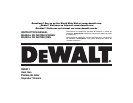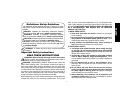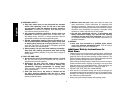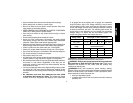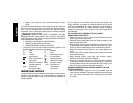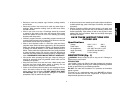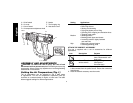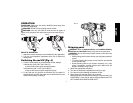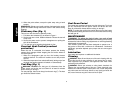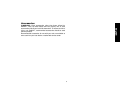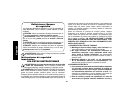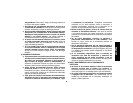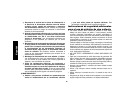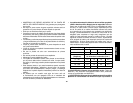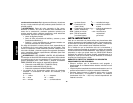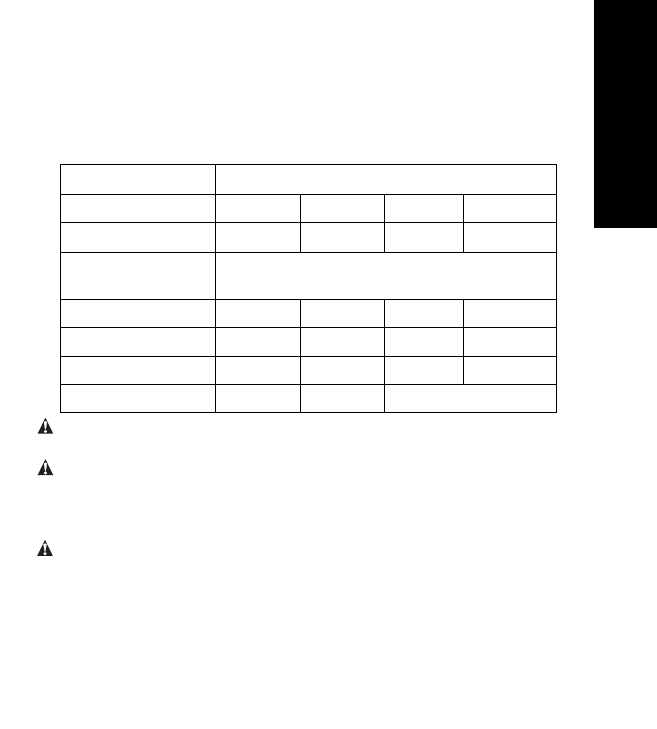
3
English
• Keep moveable items secured and steady while scraping.
• Never obstruct the air intake or nozzle outlet.
• Be sure to direct the hot air blast in a safe direction; away from
other people or flammable objects.
• KEEP FINGERS AWAY FROM METAL NOZZLE; IT BECOMES
VERY HOT. Wear gloves to protect hands.
• Don’t touch the nozzle to any surface while running or shortly
after running.
• Avoid poking anything down inside the nozzle.
• Know your work environment. Remember that areas behind
soffit board, ceilings, and floors may contain highly flammable
materials. Check these areas before applying heat.
• Splinters and small particles of stripped paint can be ignited and
blown through holes and cracks in the surface being stripped.
• Clean dry paint from the nozzle after use; it could ignite.
• Clean your scraper blade frequently during use; it could ignite.
• Do not use the heat gun in combination with chemical strippers.
• Do not use accessory nozzles as scrapers.
• Keep nozzle away from cord.
• Air vents often cover moving parts and should be avoided. Loose
clothes, jewelry or long hair can be caught in moving parts.
• Be constantly aware that this tool can ignite flammable materials,
and soften or melt others. Regardless of the task you are
performing, shield or keep away from these materials that are
close to the work area.
• You may occasionally notice some slight smoking of the tool after
it is turned off. This is the result of heating the residual oil that
was deposited on the heating element during the manufacturing
process.
• An extension cord must have adequate wire size (AWG
or American Wire Gauge) for safety. The smaller the gauge
number of the wire, the greater the capacity of the cable, that
is 16 gauge has more capacity than 18 gauge. An undersized
cord will cause a drop in line voltage resulting in loss of power
and overheating. When using more than one extension to make
up the total length, be sure each individual extension contains
at least the minimum wire size. The following table shows the
correct size to use depending on cord length and nameplate
ampere rating. If in doubt, use the next heavier gauge. The
smaller the gauge number, the heavier the cord.
Voltage (Volts)
Total length of cord in meters (m)
120 - 127V 0 - 7 7 - 15 15 - 30 30 - 50
220 - 240V 0 - 15 15 - 30 30 - 60 60 - 100
Rated Ampere
range
Minimal cross-sectional area of the
cord in meters (mm
2
)
0 - 6A 1.0 1.5 1.5 2.5
6 - 10A 1.0 1.5 2.5 4.0
10 - 12A 1.5 1.5 2.5 4.0
12 - 16A 2.5 4.0 Not Recommended
WARNING: Always use eye protection. All users and bystanders
must wear eye protection that conforms to ANSI Z87.1.
WARNING: Always wear proper personal hearing protection
that conforms to ANSI S12.6 (S3.19) during use. Under some
conditions and duration of use, noise from this product may
contribute to hearing loss.
WARNING: Some dust created by power sanding, sawing,
grinding, drilling, and other construction activities contains chemicals
known to cause cancer, birth defects or other reproductive harm.
Some examples of these chemicals are:
• lead from lead-based paints,
• crystalline silica from bricks and cement and other masonry
products, and



